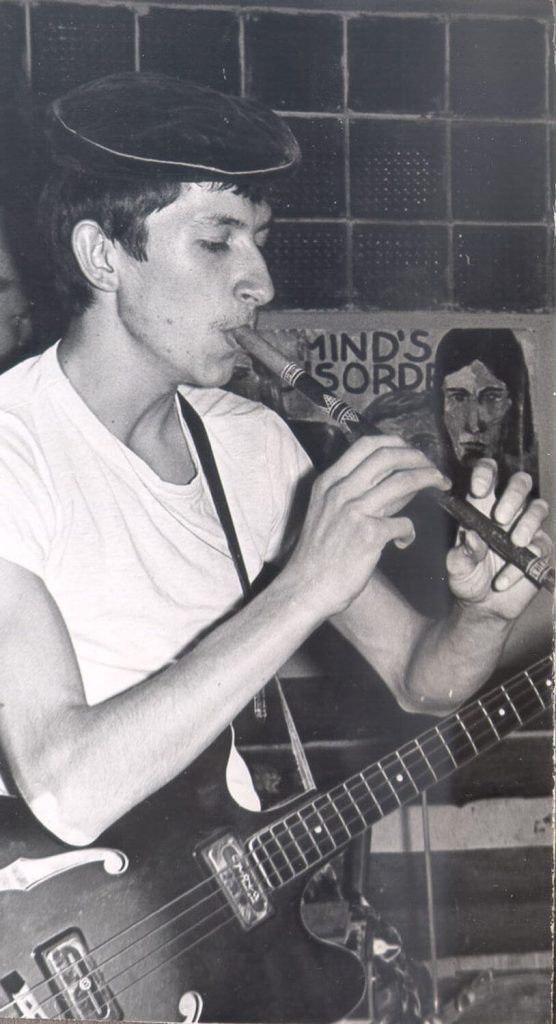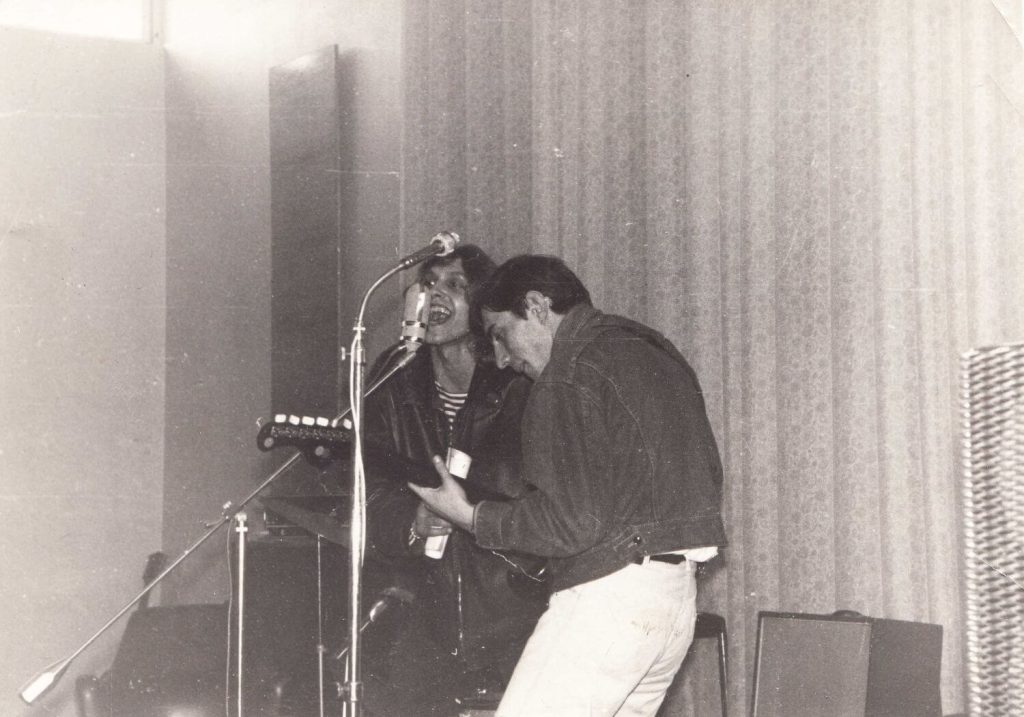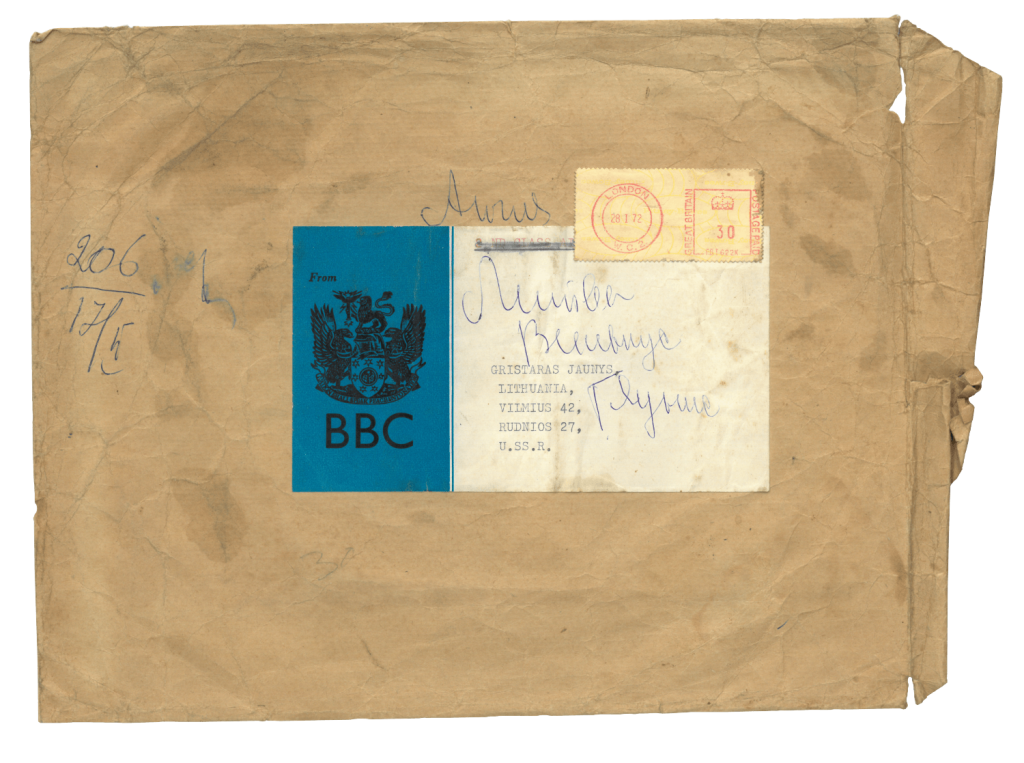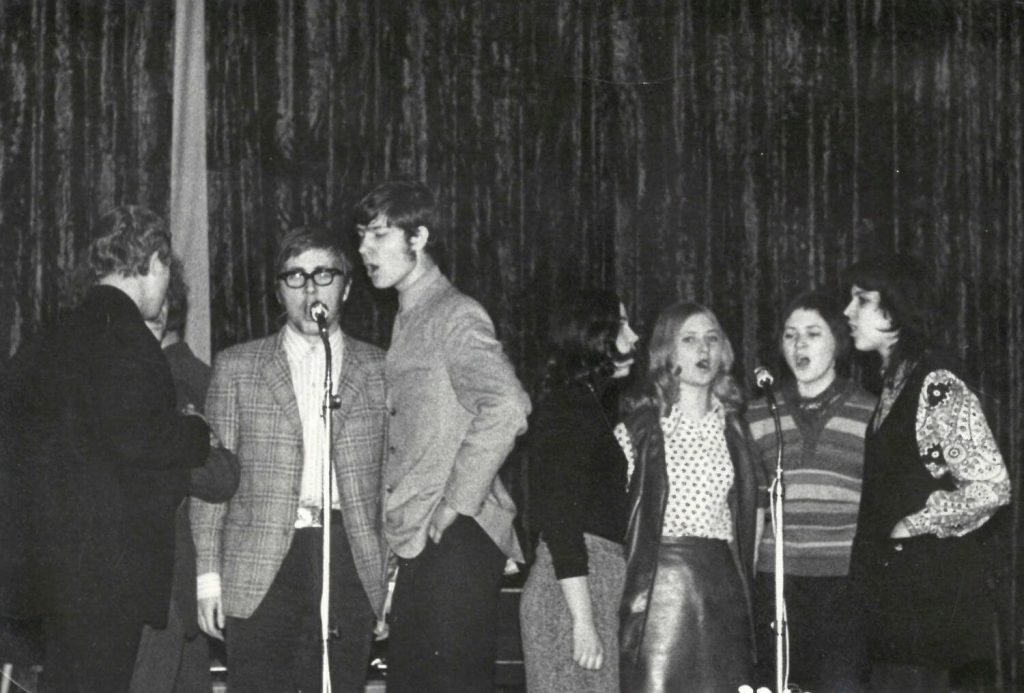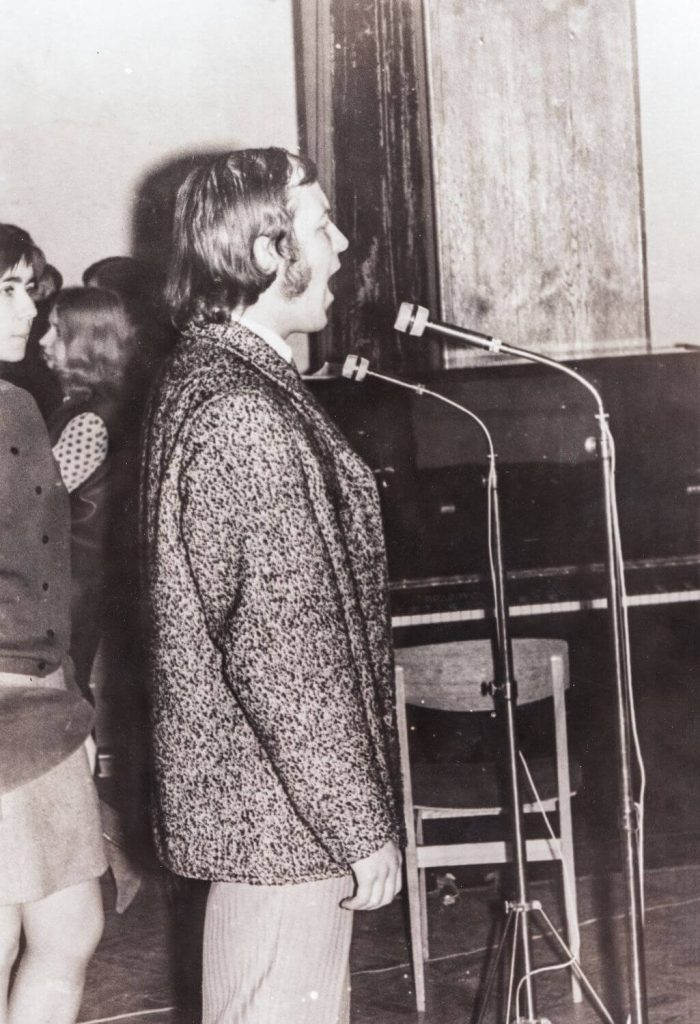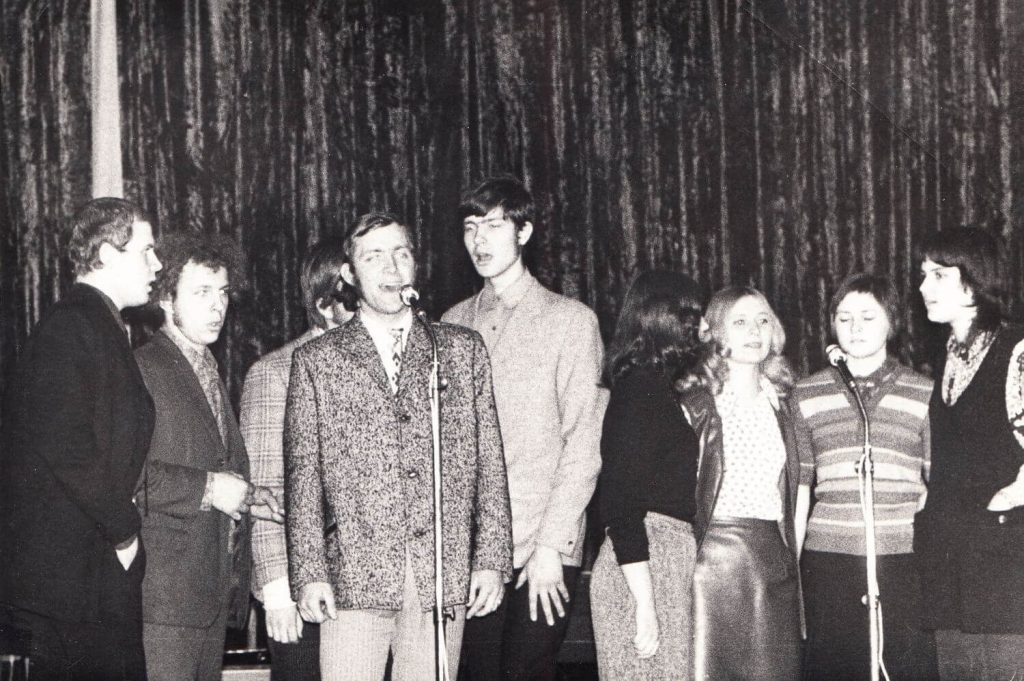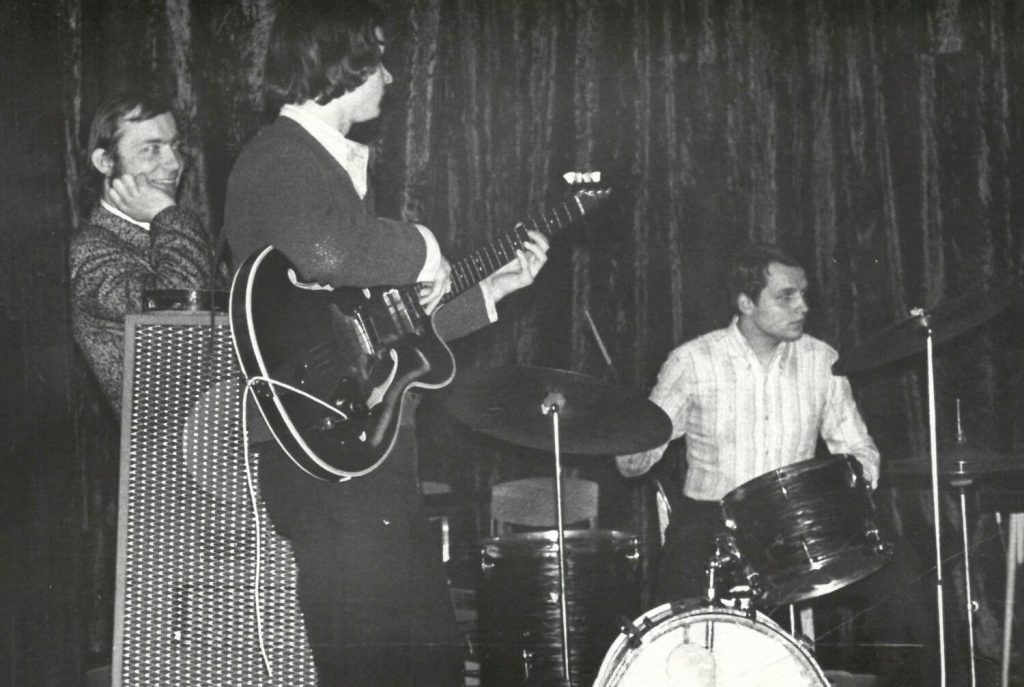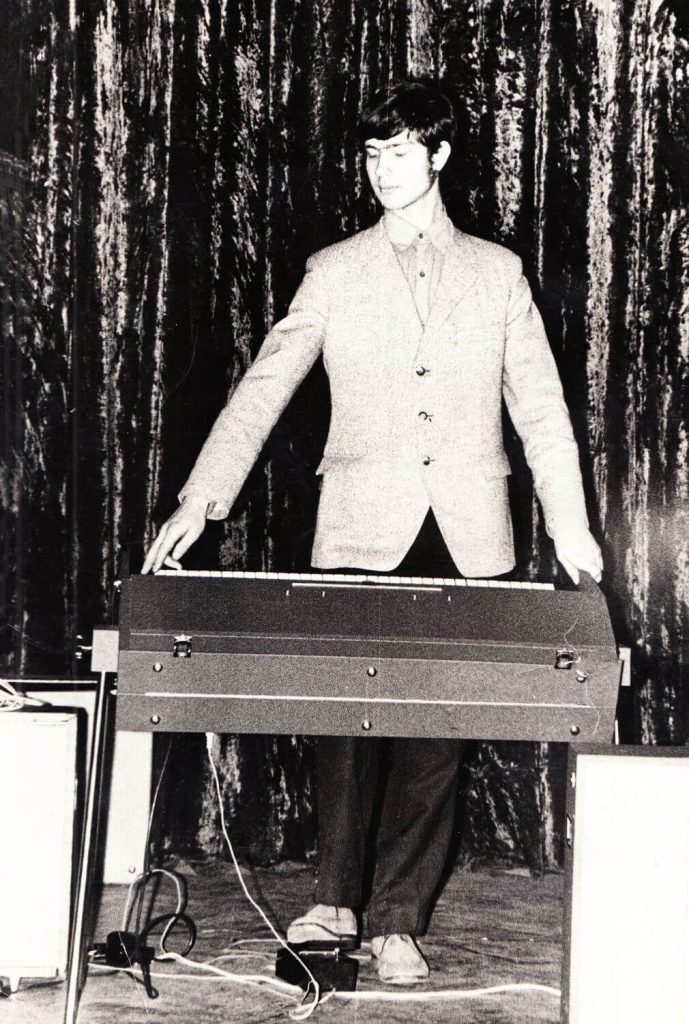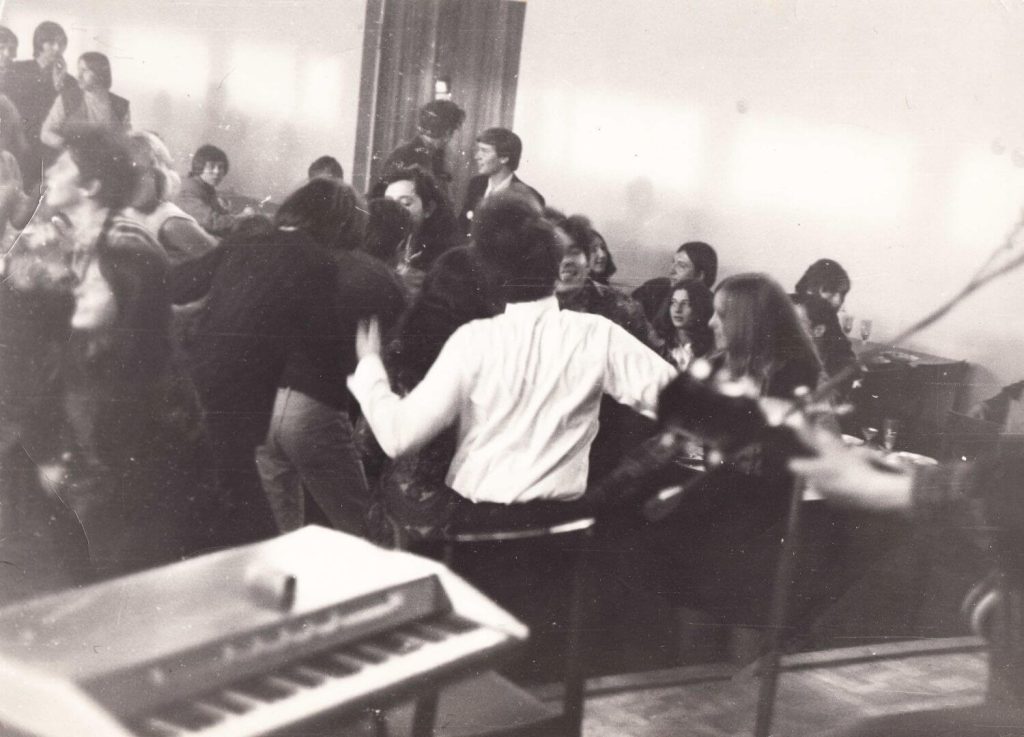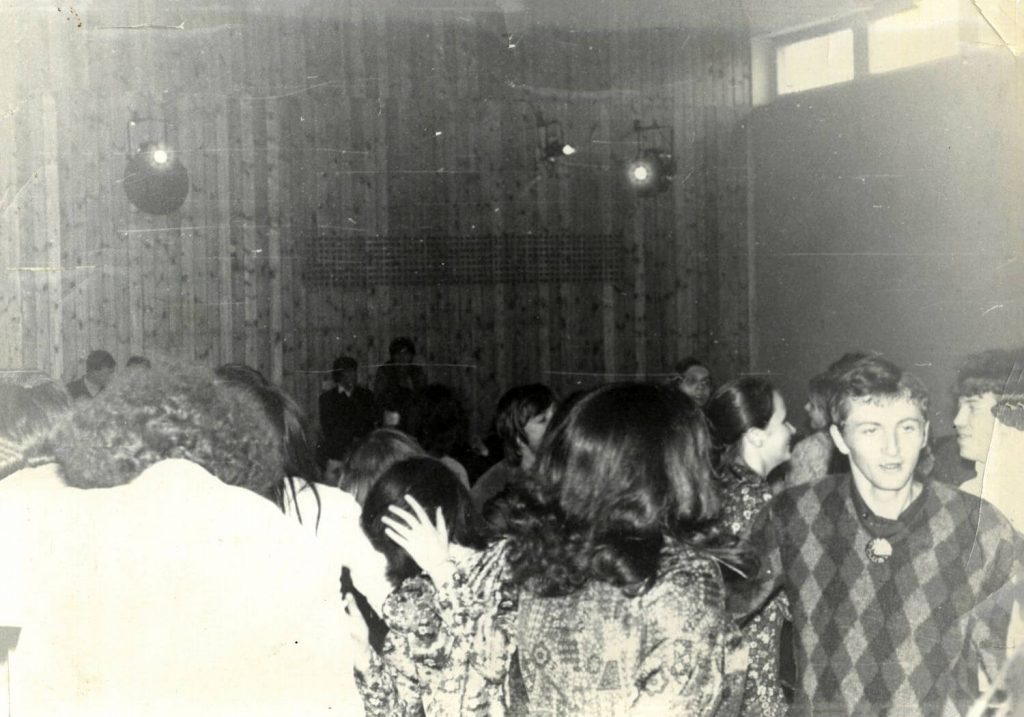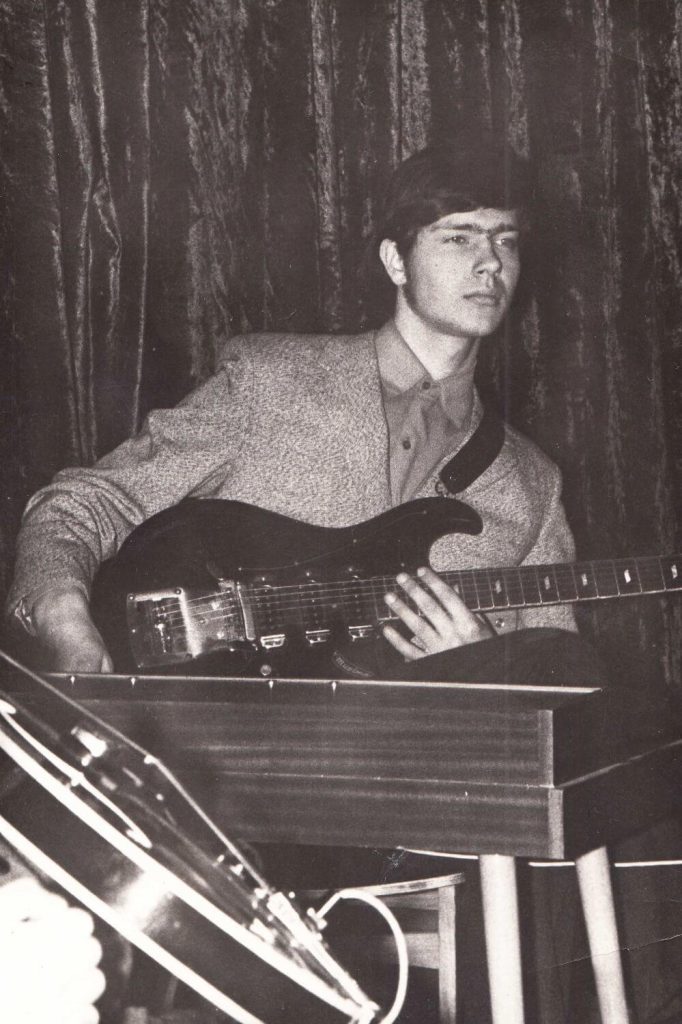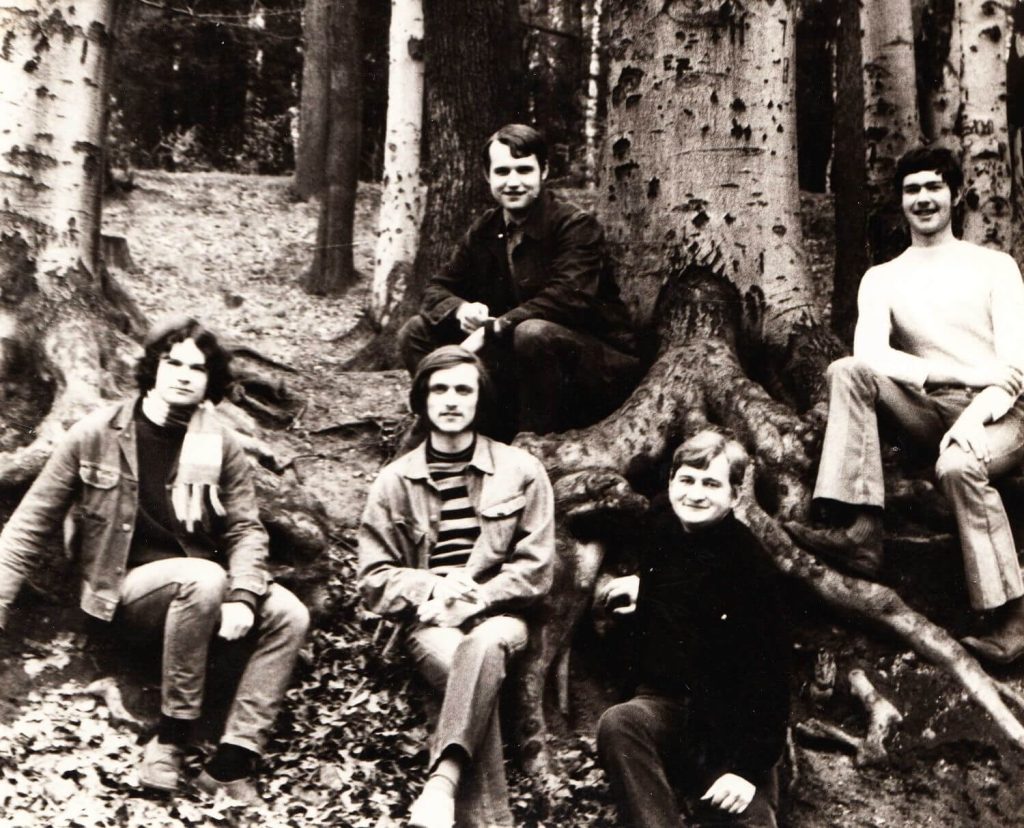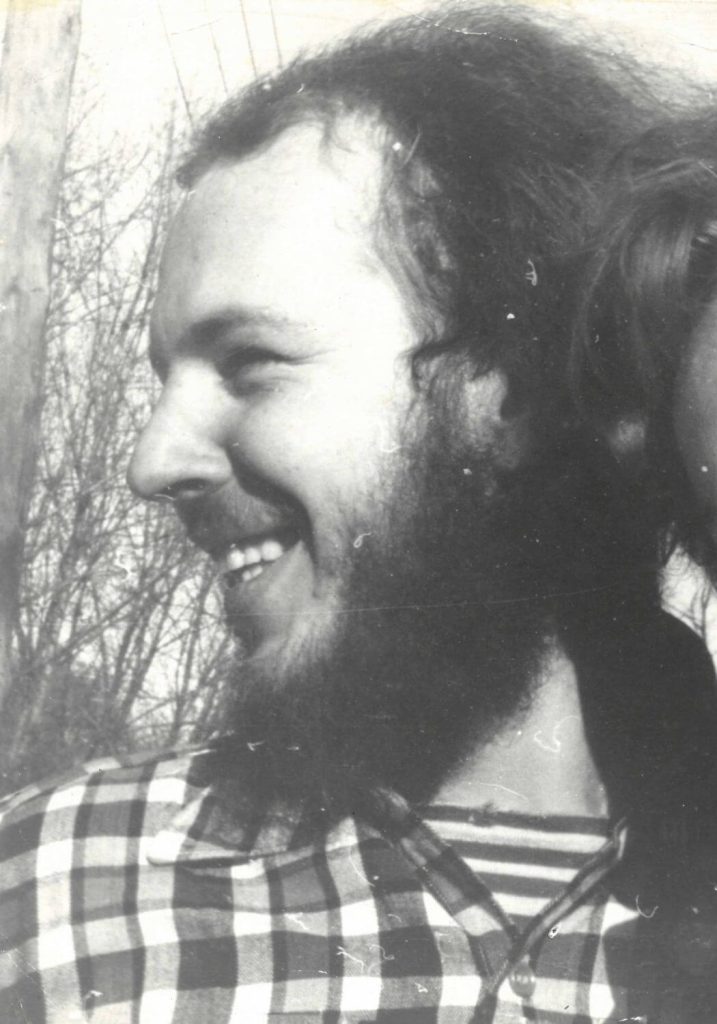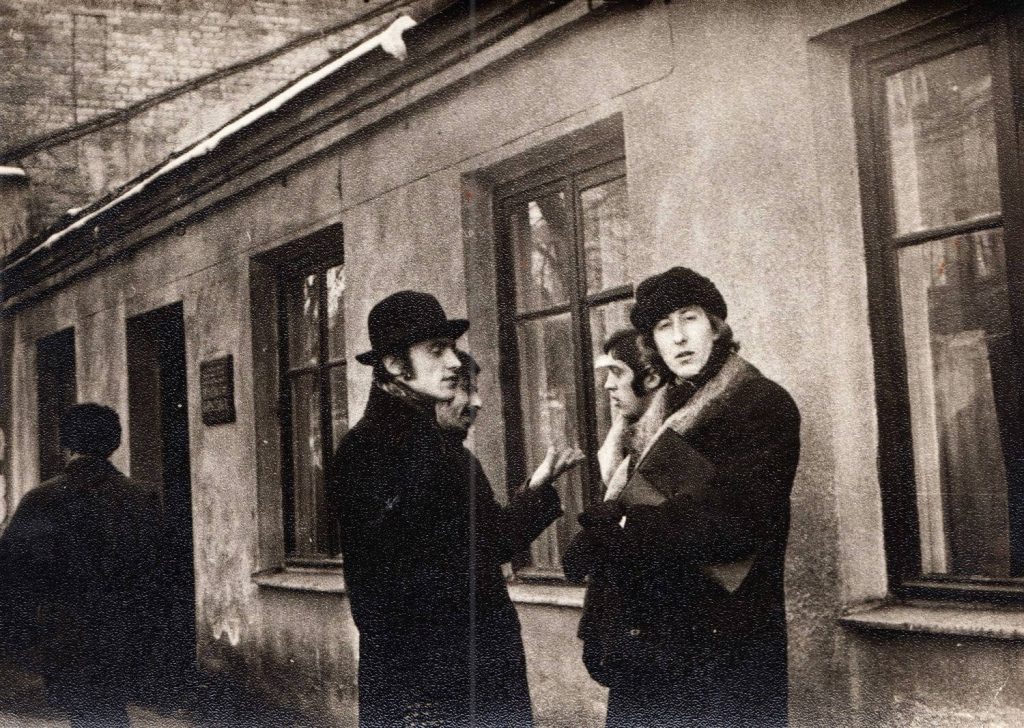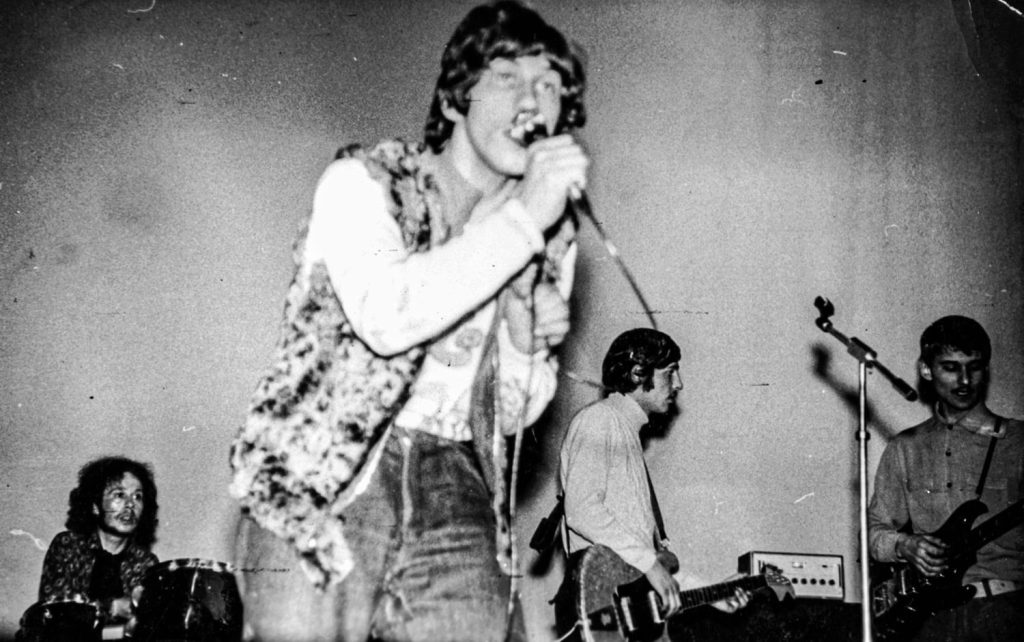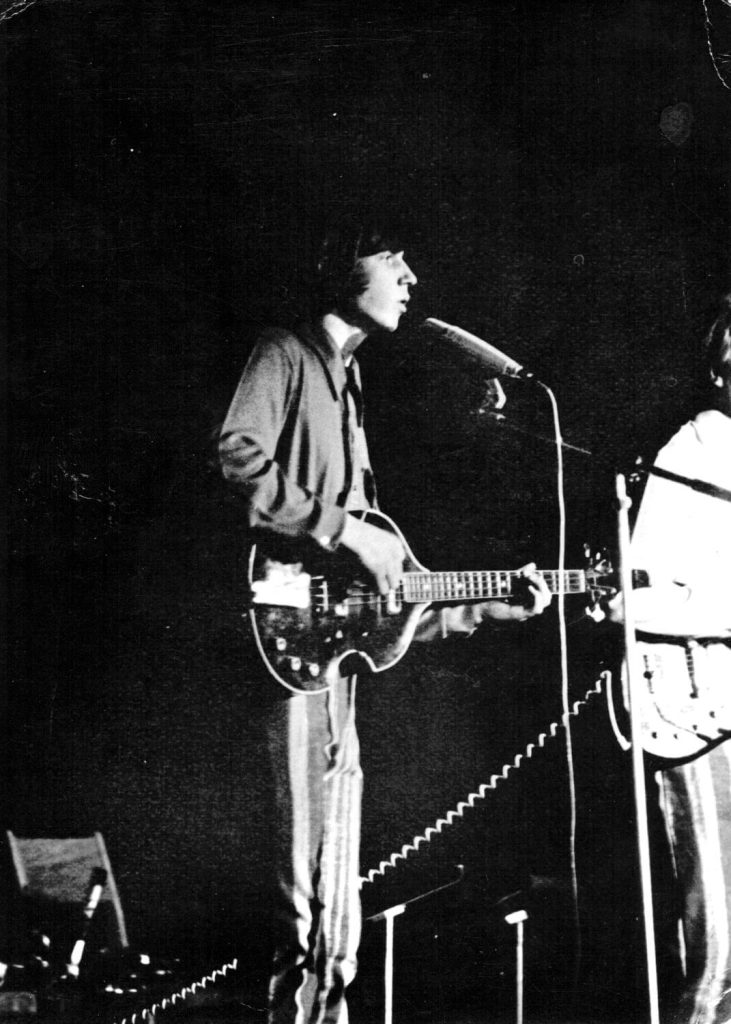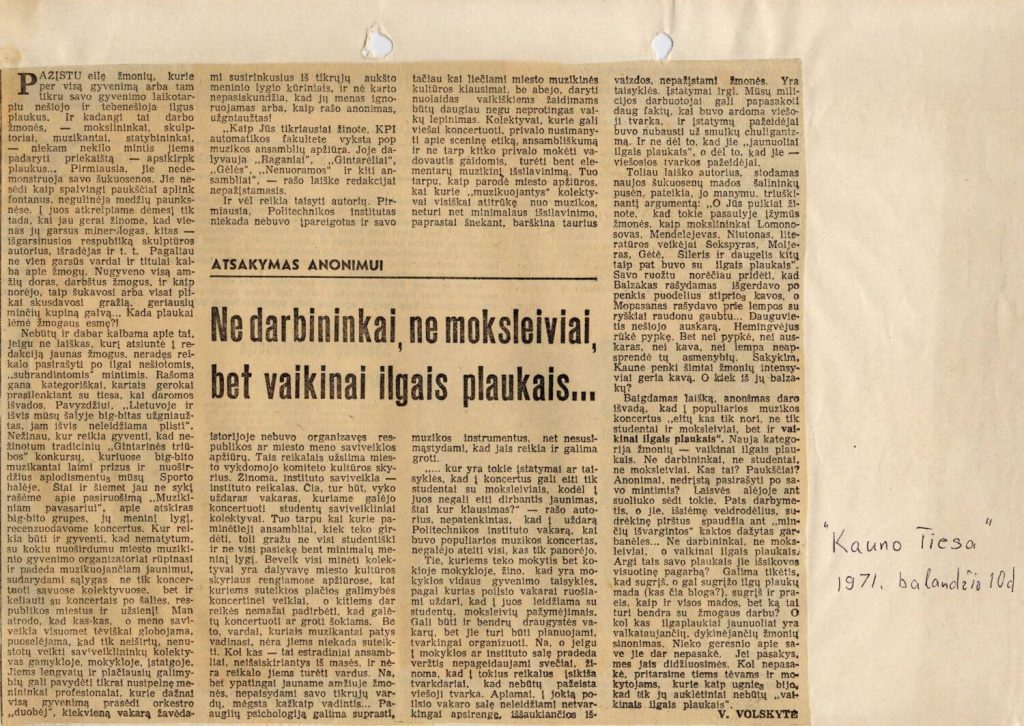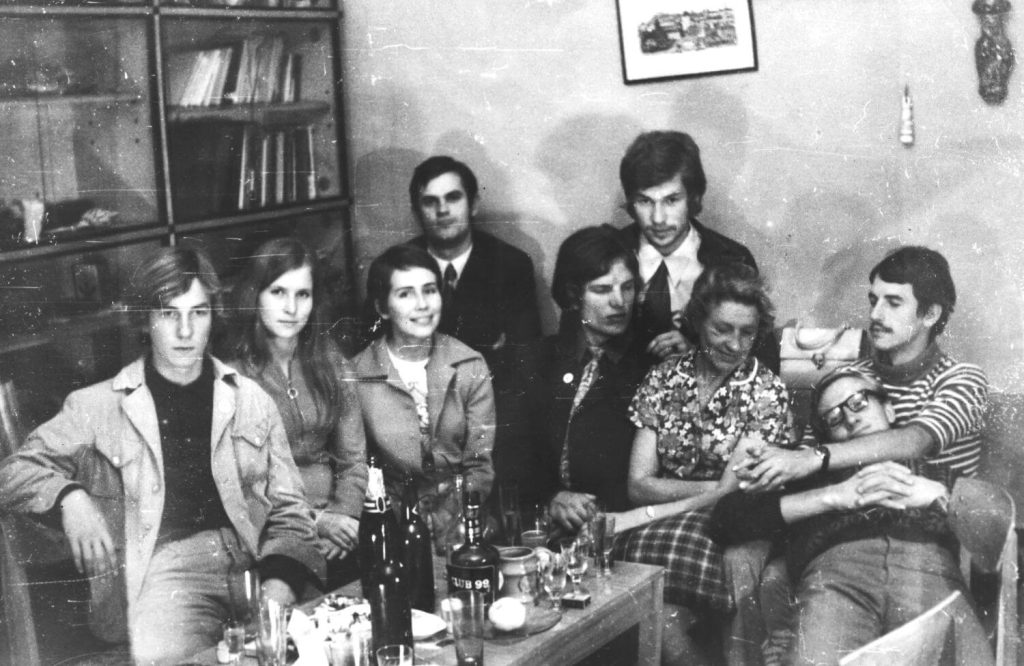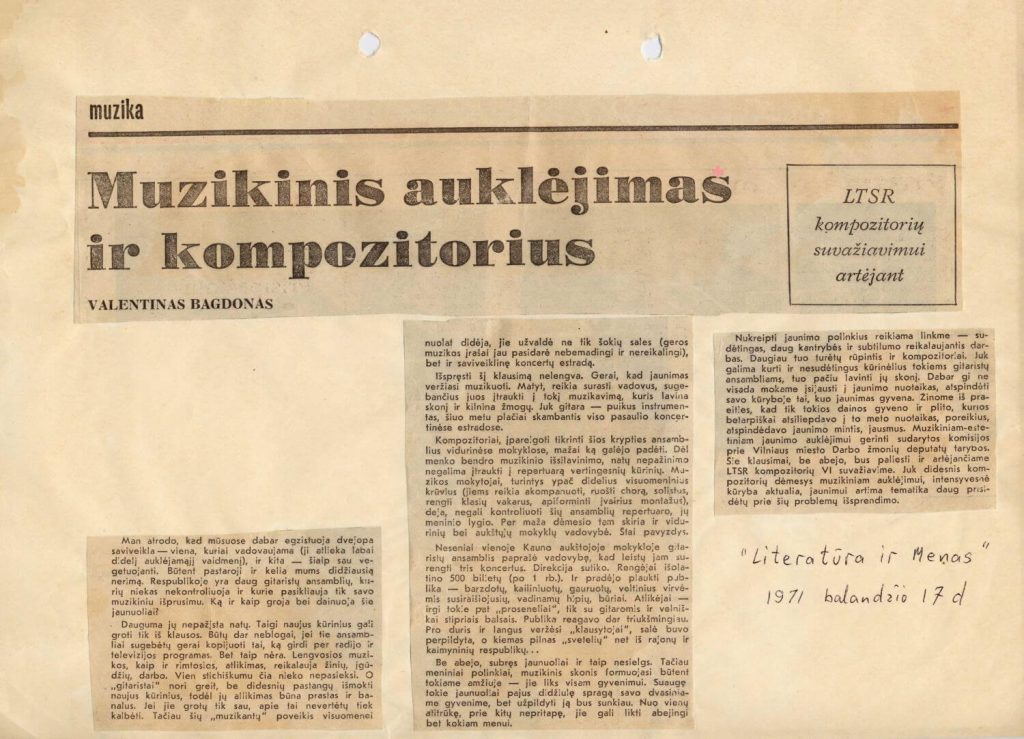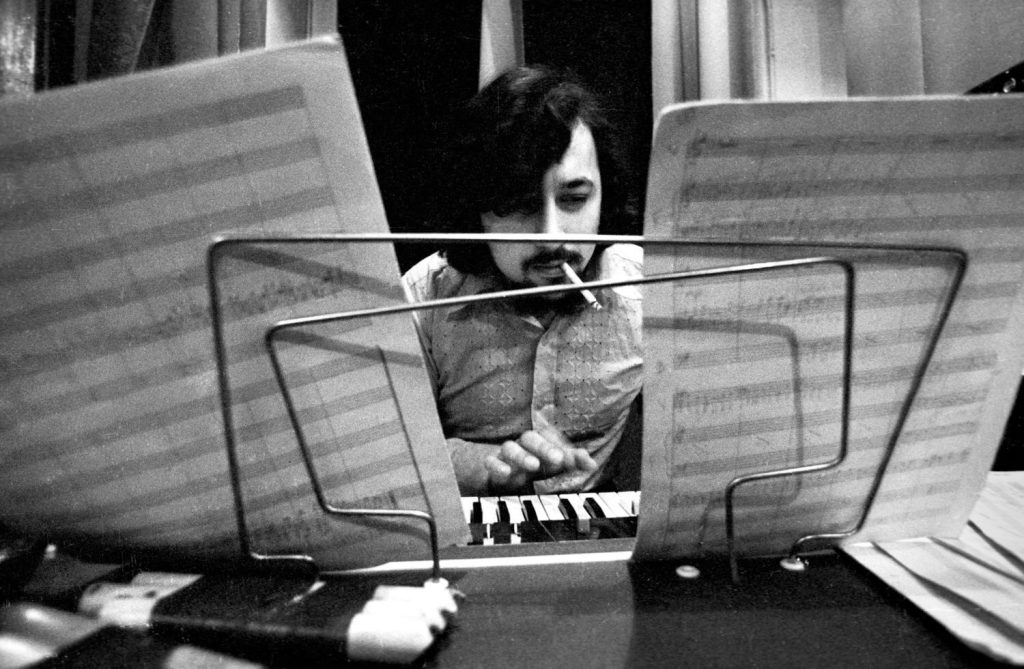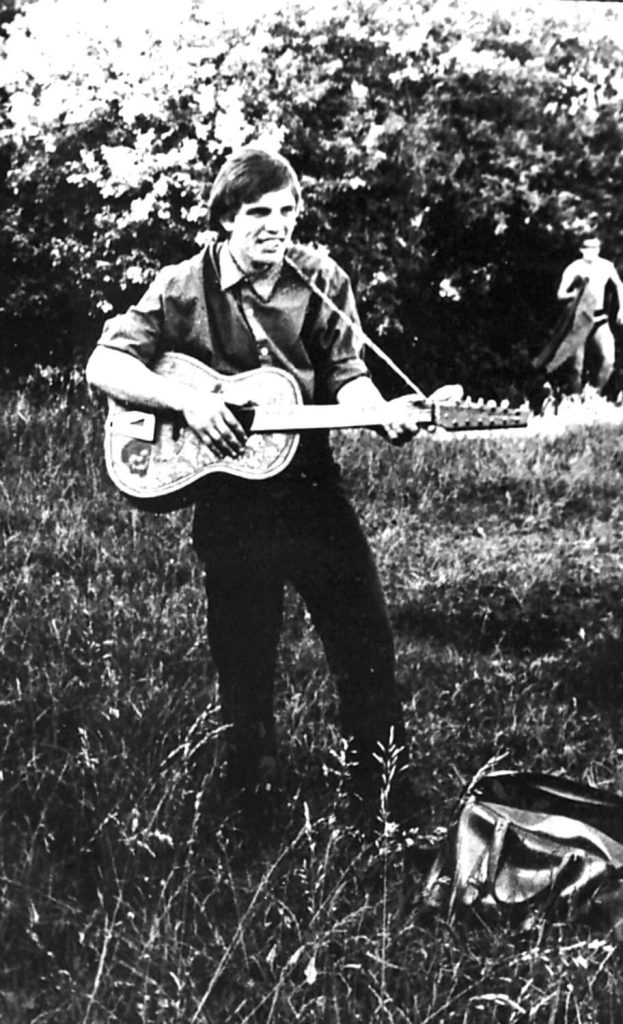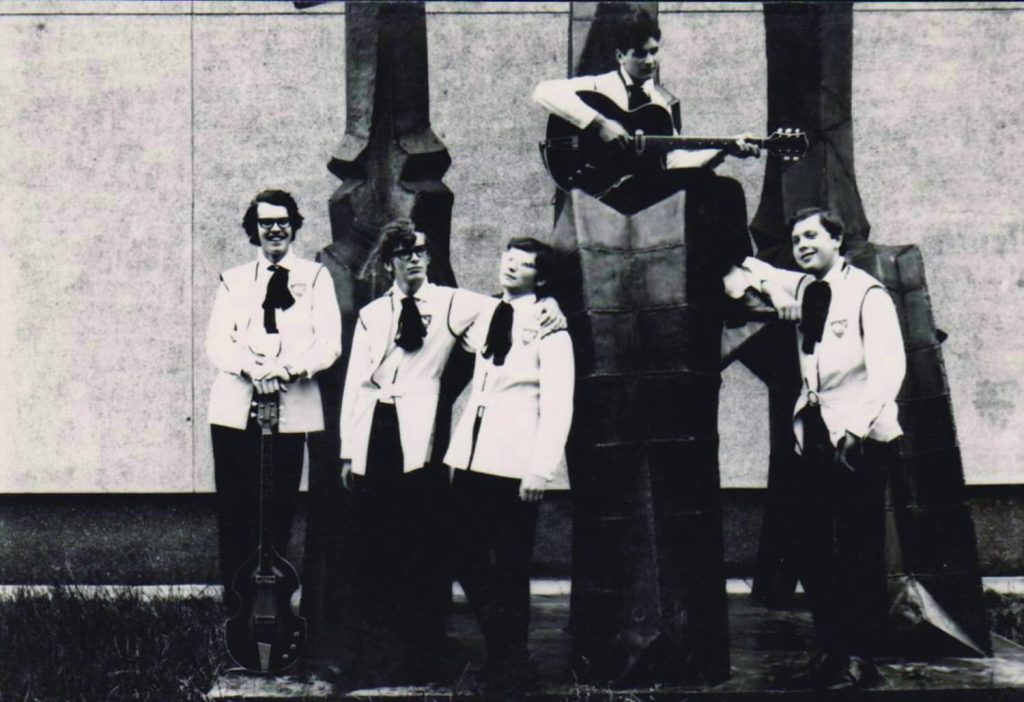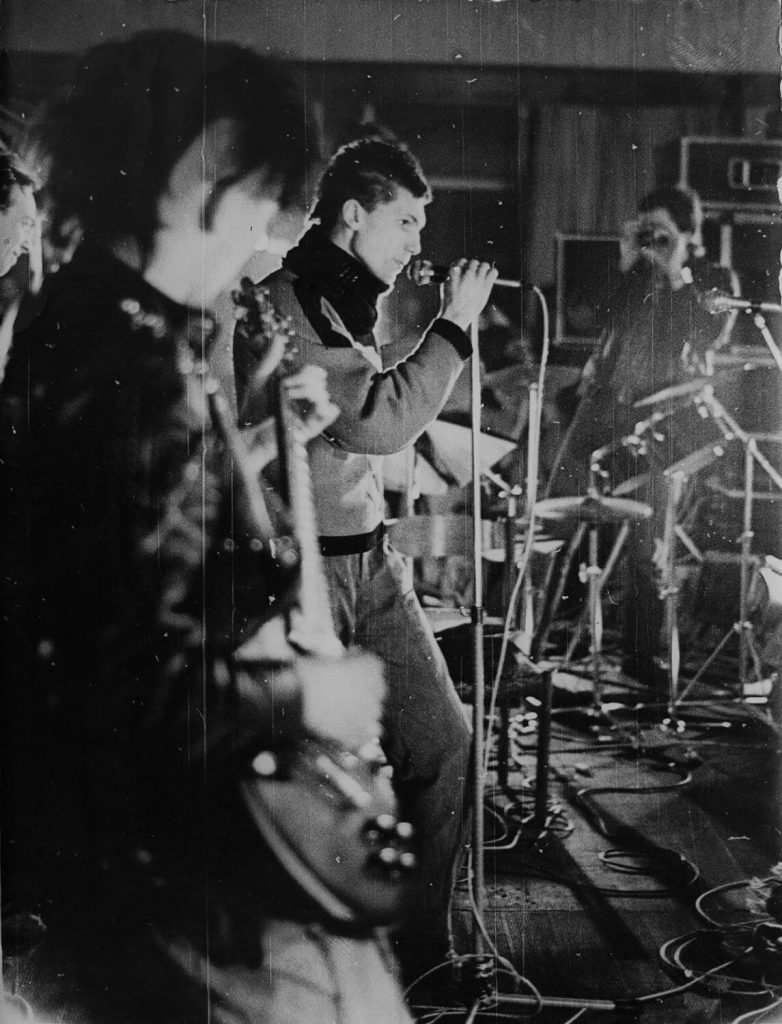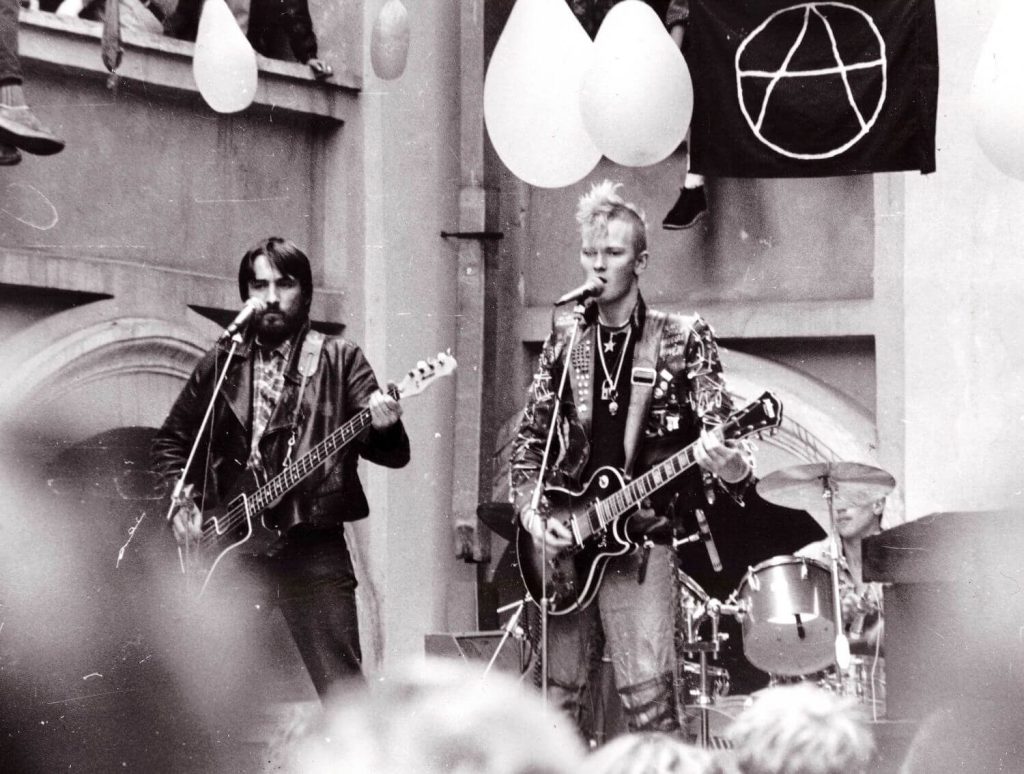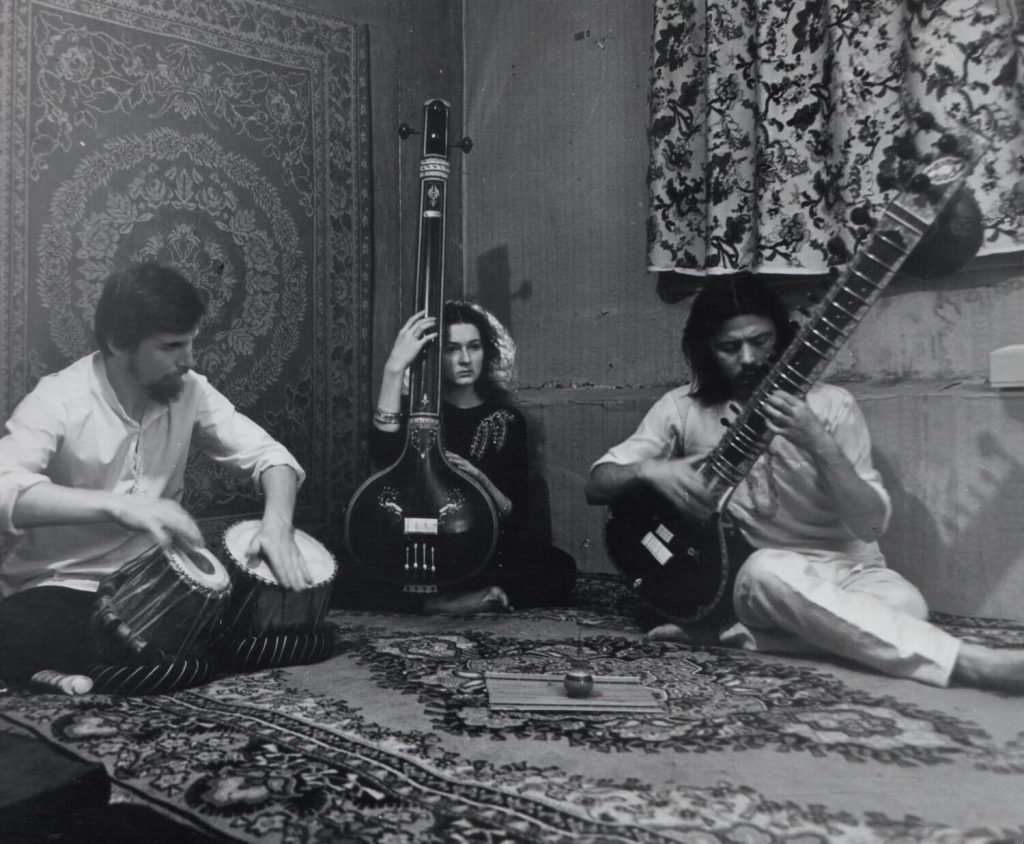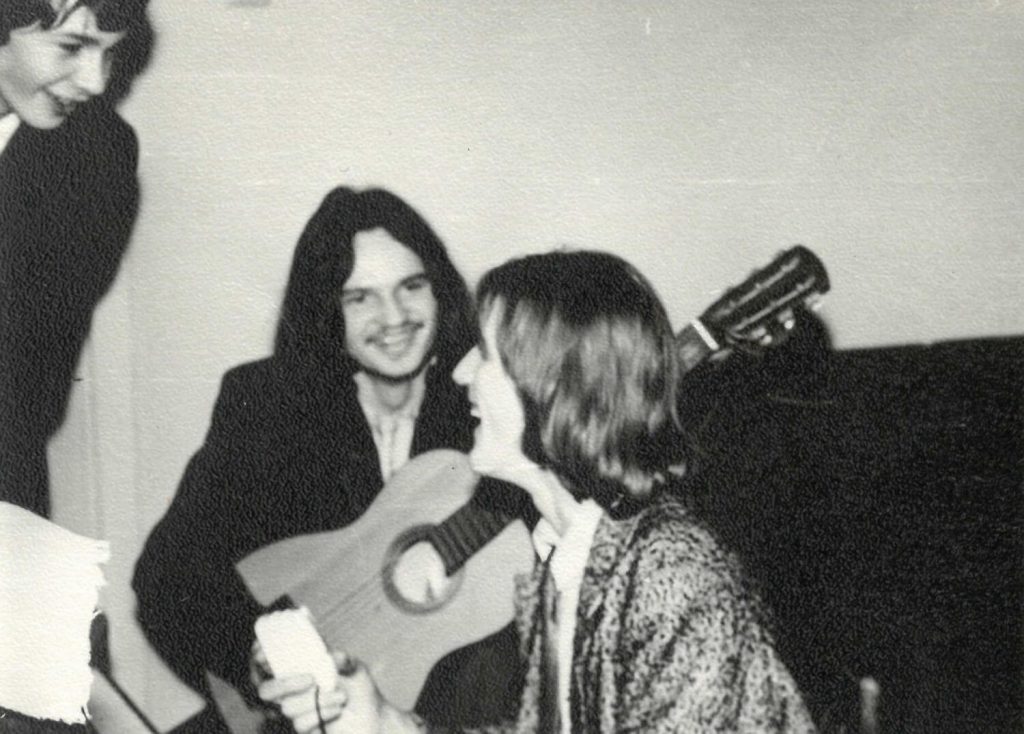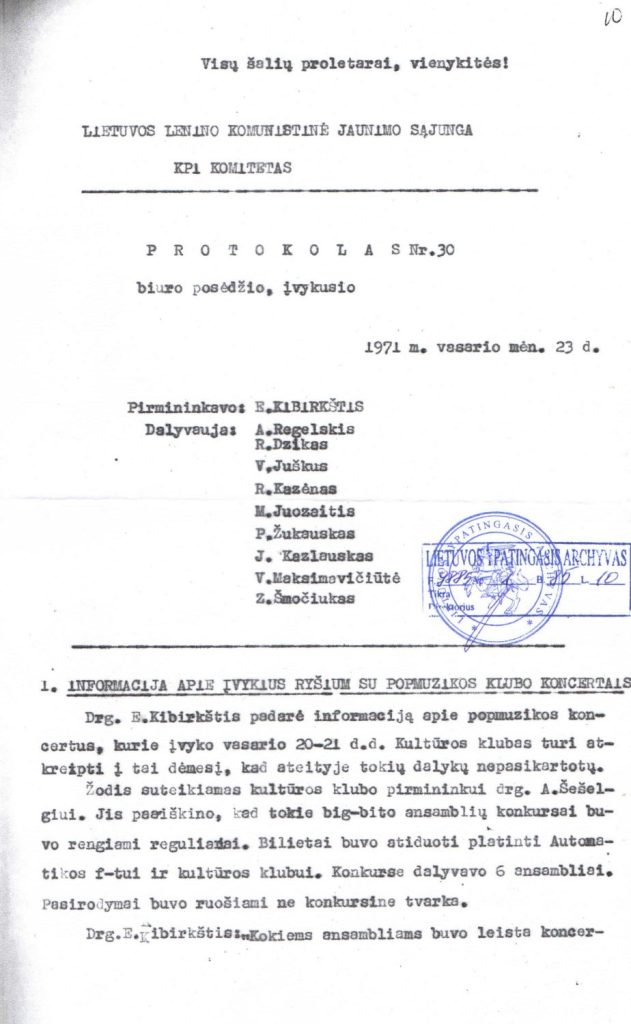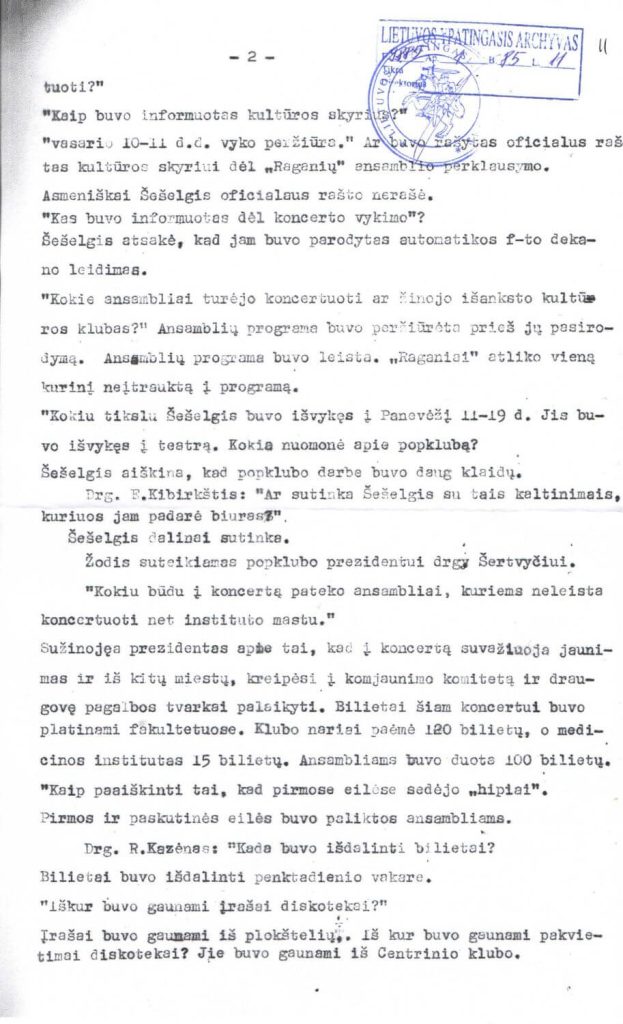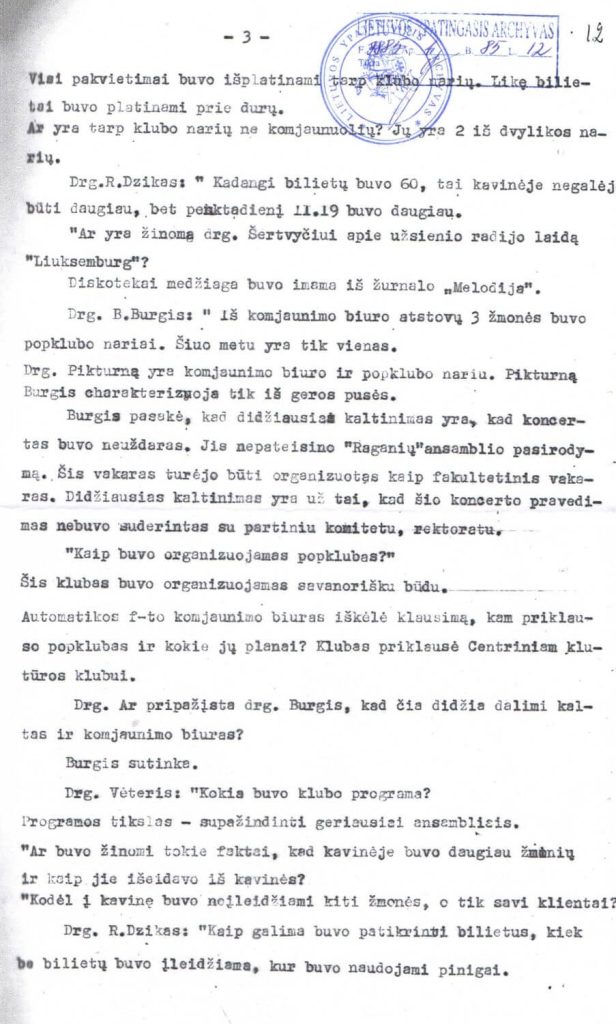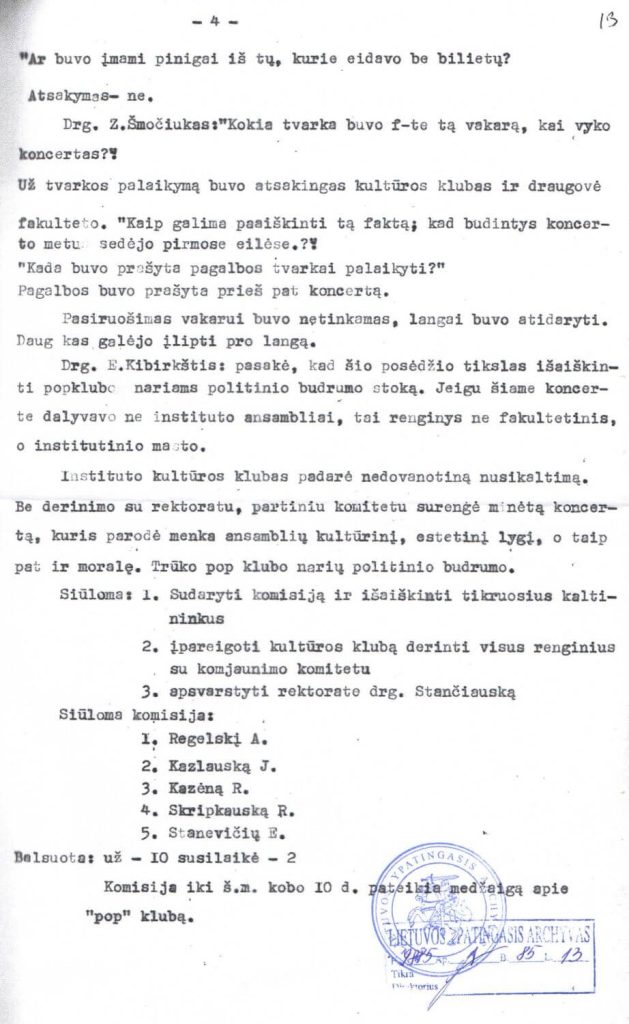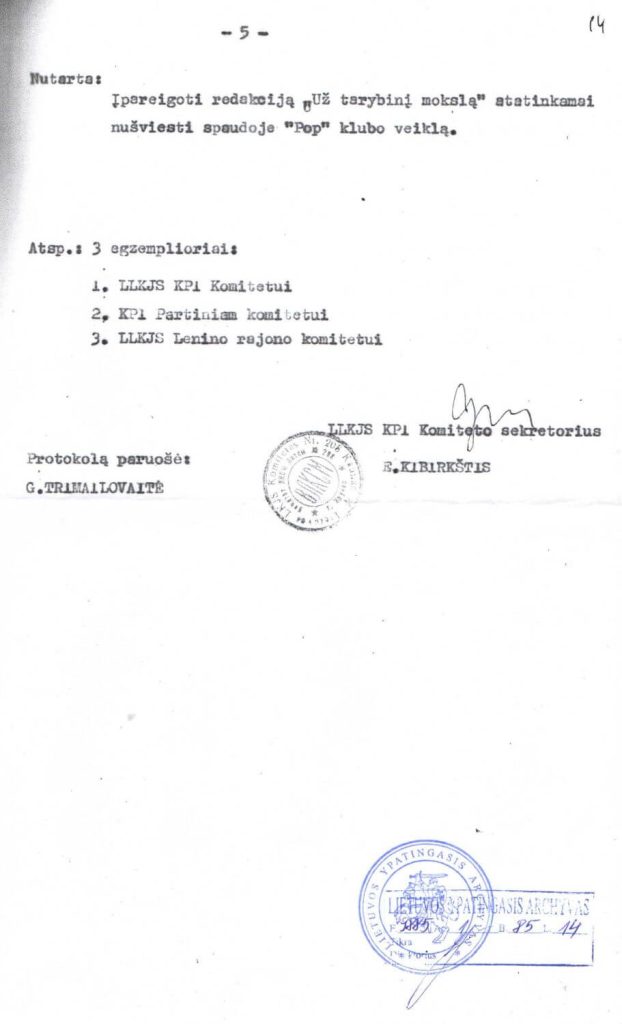The Rebellion of Youth (1964–1991)
MUSIC
And I would think I woke up at the wrong time
And that all I did was travel around the tree in the yard
What I wanted to say – I said to myself
Everyone here was dressed in red
Perhaps you know if clothes like that burn well?!
Saulės slėnis (“Valley of the Sun”) by Raganiai
Lyrics by drummer Natanas Gitkindas
Envelope of a BBC Music Club package sent to Gintaras Taunys. The Taunys family home on Rudnios Street in Vilnius, dubbed the “house of unlocked doors” by the hippie community, was home to siblings Alvitas, Gintaras, and Arūnė, who corresponded with a BBC radio host and became members of the global BBC Music Club. They received BBC T-shirts as gifts. Passersby, puzzled by the unfamiliar logo on their shirts, decoded “BBC” in Soviet fashion as Военно-воздушные силы (“Air Force”). Postmark on the envelope: London, 28 January 1972
(personal archive of Arūnė Taunytė)
Young people not only listened to music – they also began to write it themselves and felt like they were part of the world. In the mid-1960s, Lithuanian rock appeared. Songs by bands like Gintarėliai (“Little Ambers”), Dobilas (“Clover”), Kertukai, Antanėliai, Gėlių vaikai (“Flower Children”), Raganiai (“The Witches”), Nuogi ant slenksčio (“Naked on the Threshold”), Chairs and WC, though constrained, echoed in dance halls and other spaces, and disturbed the peace for “honest Soviet citizens”. The system created a mechanism to paralyse this life: approvals of concerts, competition repertoires and programmes, and permits to perform. The mass media accused rock artists of being unprofessional and bowing down to Western culture, and only gave a thumbs up to “professional Soviet music”, music from “socialist countries” or other “advanced” pop music. Only composers and performers who had received higher education could receive official recognition. Their music was truly professional, but often cliché, subdued and geared to the regime. Vocal and instrumental ensembles that belonged to the LSSR State Philharmonic or “merited folk ensembles” performed songs by foreign composers as well, translating the lyrics as they saw fit or appropriating their authorship. The lyrics of the song Truputį laimės (“A Little Bit of Happiness” – “And the sky is ringing from our songs, I’m happy living here” – became a popular cliché among the “Soviet Lithuanian people”. Songs like this were supposed to convince fellow countrymen that they were the happiest people in the world. Free musicians and composers tried to circumvent the barriers and hide under the wing of some factory, institution or communist organisation, but they were kept under close watch.
Rehearsal of the first production of the rock opera Jesus Christ Superstar in Europe at the Culture House of Communication Workers (now the Pac Palace). On 25 December 1971, a Christian-themed performance took place in the hall of the State Art Institute of the Lithuanian SSR, during which the apostle Simon the Zealot (Rimas Jasenka) called on the Jews to rise up against the enslavers. Second from left – Vytautas Kernagis (1951–2008), one of the initiators of the opera production. At the premiere, the actors were dressed in spectacular outfits. The next day, the KGB took the opera’s director, Kęstutis Antanėlis, from his lectures for interrogation. The composer was temporarily expelled from the Vilnius Civil Engineering Institute. “I’d say that with this rock opera, Kęstutis Antanėlis built a monument for himself. He was an extraordinary artist. With his talent and enthusiasm, he accomplished a huge feat and turned it into a historical event,” said Alė Gutauskienė, a museologist at the Lithuanian Theatre, Music and Cinema Museum.
Vilnius, 1971. Photo author unknown (personal archive of Kęstutis Antanėlis family)
In 1969, by order of the authorities, the songs recorded by Gėlių vaikai and Antanėliai at the Vilnius record studio were destroyed. On 26 April 1970, hippie music groups gathered at the Žirmūnai restaurant in Vilnius ostensibly to celebrate the birthday of Oleg Sartakov, the leader of an ensemble Sartakov Yesterday and Today, but in reality, the several hundred people there held the first Lithuanian rock festival – the first pop session. The militia and lorries full of soldiers were waiting for the crowd of participants after the concert. The KGB arrested, interrogated and threatened the most active promoters of the “rotting bourgeois culture”.
On 20–21 February 1971, the pop club Smūtkeliai, under the banner of the Komsomol organisation, put together a grandiose event in the hall of the Kaunas Polytechnic Institute Faculty of Automation featuring the most famous bands of that time. The KGB didn’t manage to ban it, but it “controlled” it in every way, interfering with the event and persecuting the organisers and participants. Hippies from Lithuania and all corners of the USSR flocked to the festival. The KGB took them off of trains or buses, caught them wherever they could, and sent them out of Kaunas. Gintaras Kušlys, who compiled the book Smūtkeliai, remembers: “[…] hippies were running back and forth, trying to get into the concert, and the militiamen were chasing them… It was really a sight to see. […] it was like a repetition for the ‘Kalanta events’ of 1972 […]” A month later, Smūtkeliai was closed, and the KGB eventually sent Algimantas Šešelgis, one of the organisers of the event, to “serve” in the occupation army near the dangerous USSR–China border. The regime’s lackeys banned the band Raganiai from rehearsing in the hall of the Kaunas Polytechnic Institute and playing at student dances.
Rehearsal of the first European production of the rock opera Jesus Christ Superstar at the Culture House of Communication Workers (now the Pac Palace). Vidas Petkevičius performs the aria of Jesus Christ. Second from the left is sculptor Mindaugas Nakas (St. Peter), and fourth is Aleksandras Babkovskis, guitarist and keyboardist of the band Antanėliai.
Vilnius, 1971. Photo author unknown (personal archive of Kęstutis Antanėlis family)
On 25 December 1971, the European premiere (and second worldwide) of Andrew Lloyd Webber’s rock opera Jesus Christ Superstar took place in the auditorium of the State Art Institute of the Lithuanian SSR. This was the first and last performance of this opera in occupied Lithuania. The next day, Kęstutis Antanėlis, who had staged the opera, was taken out of class by the KGB for questioning. The composer was temporarily expelled from the Vilnius Civil Engineering Institute and deprived of the right to continue his studies at an institution of higher education. For this event that became a legend, the talented director had put together about 35 actors and musicians, most of whom were students from the Lithuanian SSR State Conservatory and the M. K. Čiurlionis School of Art.
Rehearsal of the rock opera Jesus Christ Superstar. From left: Vidas Petkevičius, Rimas Jasenka, Donatas Janušas. In the opera, the apostle Simon the Zealot (Rimas Jasenka) called on the Jews to rise up against their oppressors.
Vilnius, 1971. Photo author unknown (personal archive of Kęstutis Antanėlis family)
The rock band Antanėliai on a concert tour in Poland. Front row from left: Rimas Jasenka, Kęstutis Antanėlis, Alfonsas Vaškevičius. Back row from left: Donatas Janušas, Aleksandras Babkovskis.
Polish People’s Republic (now Republic of Poland), 1969. Photo author unknown (personal archive of Kęstutis Antanėlis family)
Rock band Raganiai (“The Witches”) performing at the “Kaunas Pop Session” festival held in the Automation Faculty Hall of Kaunas Polytechnic Institute. From left: Natanas Gitkindas, Visvaldas Žalnierius, Anatolijus Goldšteinas, Vladimiras Kotčegarovas. After the festival, the authorities banned Raganiai from rehearsing in the hall of the Kaunas Polytechnic Institute and playing at student dances.
Kaunas, 20–21 February 1971. Photo author unknown (personal archive of Natanas Gitkindas)
Journalist Vaidilutė Volskytė’s article “Not workers, not students, but boys with long hair…” Volskytė responded to an anonymous letter received by the editorial office of Kauno Tiesa (“Kaunas Truth”). “[…] Moreover, the names that the musicians call themselves were never officially given to them. For now, these are stage ensembles indistinguishable from the masses, and there is no need for them to have names,” wrote V. Volskytė about the rock bands Raganiai (“The Witches”), Gintarėliai (“Little Ambers”), Gėlės (“Flowers”), and others who performed at the “Kaunas Pop Session” festival held on February 20–21, 1971, at the Kaunas Polytechnic Institute’s Faculty of Automation hall and were persecuted by the authorities.
Newspaper Kauno Tiesa (“Kaunas Truth”), 10 April 1971.
Farewell of Algimantas Šešelgis, one of the leaders of the youth club “Smūtkeliai,” as he was drafted into the occupying forces. The KGB sent A. Šešelgis to “serve” in the occupying army near the dangerous USSR–China border.
Kaunas, August 1972. Photo author unknown (personal archive of Algimantas Šešelgis)
Composer Valentinas Bagdonas, in his article “Musical Education and the Composer” in the weekly Literatūra ir menas (“Literature and Art”), criticizes Lithuanian rock musicians and briefly describes his impressions of the “Kaunas Pop Session” rock festival held on February 20–21, 1971, at the Faculty of Automation hall of the Kaunas Polytechnic Institute.
Literatūra ir menas (“Literature and Art”) weekly, 10 April 1971.
Protocol No. 30 of the meeting of the KPI (Kaunas Polytechnic Institute) Bureau of the Leninist Communist Youth Union of Lithuania, held on February 23, 1971. The meeting addressed the leaders of the pop club “Smūtkeliai”, Algirdas Šešelgis and Robertas Šertvytis, regarding the concert held on February 21–22 in the Faculty of Automation hall. The summoned were reprimanded for the repertoire of the rock band Raganiai, other ensembles who were not allowed “to perform even at the institute level”, the “hippies” sitting in the front rows of the event, and the open windows of the hall. Questions were raised about where the youths obtained music recordings, whether there were any “non–Komsomol members” among the club members, and whether “comrade Šertvytis was aware of the foreign radio program ‘Luxembourg’.” The organizers were accused of holding the concert without coordination with the party committee and rectorate. The activists explained to those summoned that “the main purpose of the meeting was to point out the pop club members’ lack of political vigilance”, which had led to “an unforgivable offense”. A month later, “Smūtkeliai” was shut down, and later the KGB sent Algimantas Šešelgis, one of the event organizers, to “serve” in the occupying army near the dangerous USSR–China border. The regime’s lackeys banned the band Raganiai from rehearsing in the Kaunas Polytechnic Institute hall and from playing at student dance events.
Kaunas, 23 February 1971 (personal archive of Algimantas Šešelgis)
